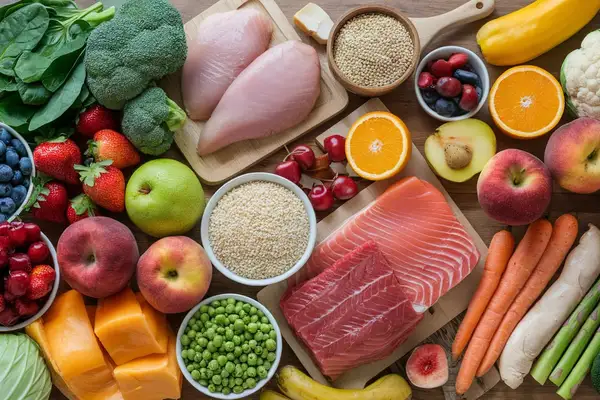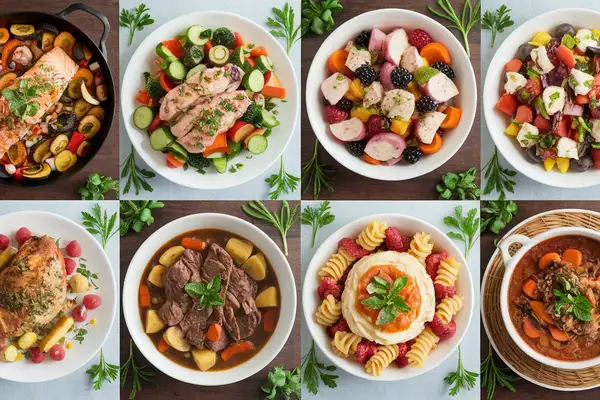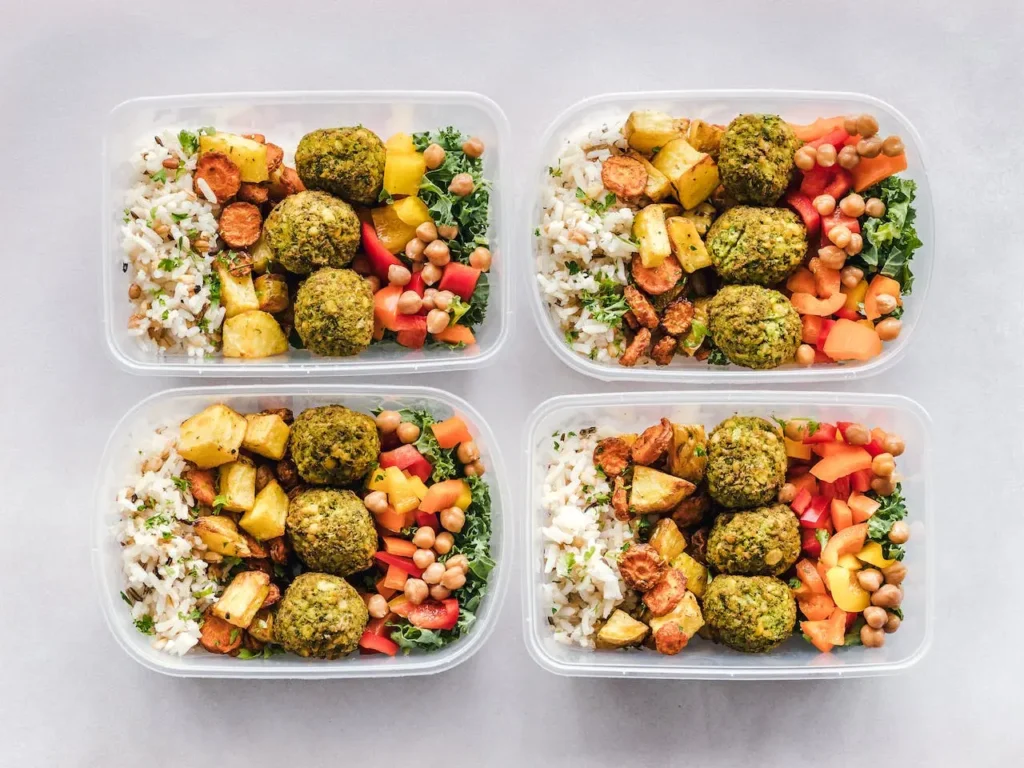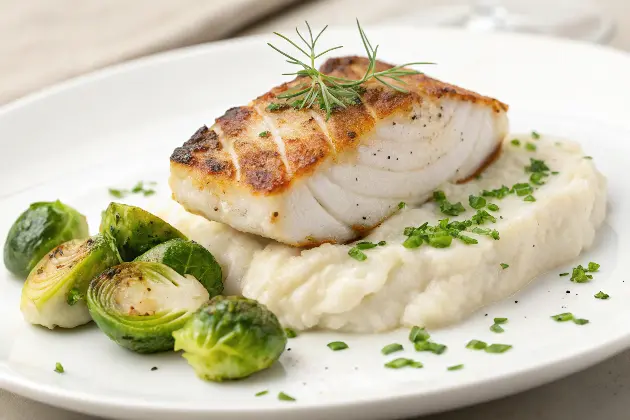7-Day Insulin Resistance Diet Plan: Best Foods for Insulin Resistance
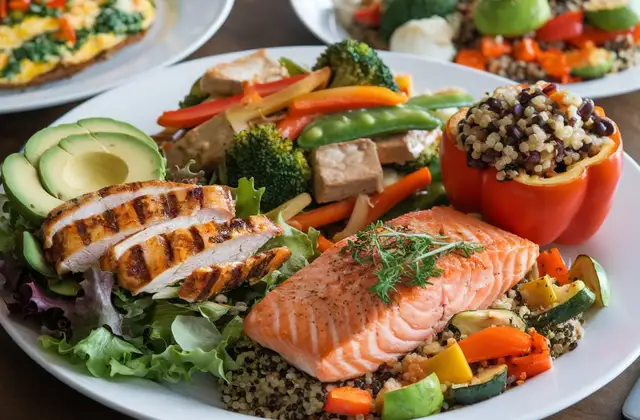
What Is Insulin Resistance?
This post may contain affiliate links, meaning I may earn a commission if you make a purchase, at no extra cost to you. I only recommend products I trust. Thank you for your support.
Insulin resistance is a condition in which the body’s cells don’t respond well to insulin, a hormone responsible for helping glucose (sugar) enter cells.
When this happens, glucose builds up in the blood instead of being used for energy, leading to higher blood sugar levels.
Over time, insulin resistance can increase the risk of type 2 diabetes, heart disease, and other health issues.
An insulin resistance diet plays a huge role in managing insulin resistance, as the right foods help improve how your body processes glucose.
This insulin resistance diet plan is filled with insulin resistance meals that balance your blood sugar and satisfy you without feeling restricted.
Additionally, discover the best foods for insulin resistance, the worst foods for insulin resistance, insulin resistance recipes, and the fastest way to lose weight with insulin resistance.
What Causes Insulin Resistance?
Insulin resistance is primarily caused by a combination of genetic, lifestyle, and environmental factors that impact the body’s ability to use insulin effectively.
Here’s a breakdown of some common causes:
- Excess Body Weight and Obesity: Extra body fat, especially around the abdomen, increases inflammation and fatty acids, which disrupt insulin signaling and glucose absorption.
- Physical Inactivity: Being sedentary reduces the body’s ability to use glucose effectively, while regular exercise improves insulin sensitivity.
- Unhealthy Diet: Diets high in refined sugars, processed foods, and unhealthy fats cause blood sugar spikes, raising insulin demand and contributing to insulin resistance.
- Chronic Inflammation: Inflammatory responses, often due to obesity, poor diet, or certain health conditions, can impair insulin function, leading to insulin resistance.
- Hormonal Imbalances: Conditions like polycystic ovary syndrome (PCOS) and elevated stress hormones, such as cortisol, can reduce insulin sensitivity.
- Genetics and Family History: A family history of type 2 diabetes or insulin resistance increases the likelihood of developing insulin resistance.
- Lack of Sleep: Poor sleep quality or insufficient sleep can increase stress hormones and make it harder for the body to manage blood sugar, contributing to insulin resistance.
- Certain Medications: Some medications, like corticosteroids and certain antipsychotics, may contribute to insulin resistance as a side effect.
- Aging: Insulin resistance tends to increase with age due to hormonal changes, muscle mass reduction, and lifestyle factors, though it is not inevitable with age.
7-Day Insulin Resistance Diet Plan
This insulin resistance diet plan focuses on low glycemic foods that improve your body’s sensitivity to insulin and manage blood sugar levels more effectively.
This 7 day meal plan for insulin resistance features healthy insulin resistance meals, using only foods for insulin resistance such as low glycemic index foods, high fiber foods, complex carbohydrates, lean proteins, and healthy fats.
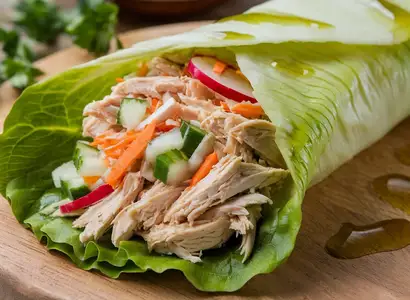
Day 1
Breakfast:
- Greek Yogurt Bowl: Layer Greek yogurt, berries, chia seeds, and walnuts. (1 cup Greek yogurt, ½ cup mixed berries, 1 tbsp chia seeds, ¼ cup walnuts)
Lunch:
- Turkey Lettuce Wraps: Sauté ground turkey with spices, wrap in large lettuce leaves, and top with avocado slices. (4 oz ground turkey, 3 large lettuce leaves, ½ avocado)
Dinner:
- Salmon and Quinoa Bowl: Bake salmon fillet, cook quinoa, roast zucchini, carrots & bell peppers, then assemble. (6 oz salmon, ½ cup cooked quinoa, 1 cup roasted veggies)
Snacks:
- Apple Slices: Core and slice apple into wedges. (½ cup apple slices)
- Air‑Popped Popcorn: Pop kernels without oil or salt. (2 cups popcorn)
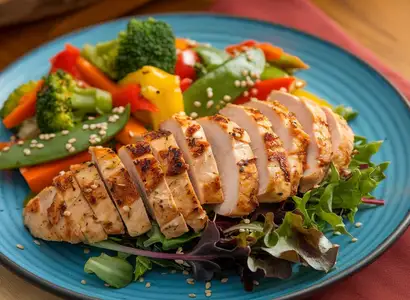
Day 2
Breakfast:
- Avocado & Veggie Omelette: Whisk eggs, cook with spinach and bell peppers, then fold in avocado. (2 eggs, ½ cup spinach, ¼ cup diced bell peppers, ¼ avocado)
Lunch:
- Chickpea Salad: Toss mixed greens, cherry tomatoes, cucumber, and chickpeas; drizzle with olive oil. (2 cups greens, ½ cup chickpeas, ½ cup cherry tomatoes, ½ cup cucumber, 1 tbsp olive oil)
Dinner:
- Chicken Stir‑Fry: Sauté chicken breast and mixed veggies in olive oil and light soy sauce. (6 oz chicken, 2 cups mixed veggies, 1 tbsp light soy sauce)
Snacks:
- Cucumber Slices: Peel and slice cucumber into rounds. (1 cup cucumber slices)
- Rice Cakes: Toast rice cakes if desired and serve plain. (2 rice cakes)
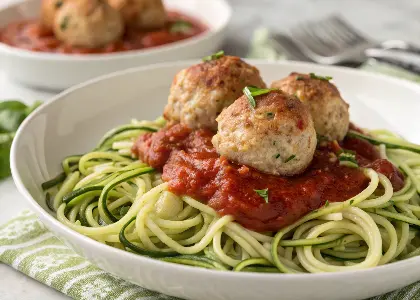
Day 3
Breakfast:
- Chia Seed Pudding: Stir chia seeds into almond milk, refrigerate overnight; top with cinnamon and berries. (2 tbsp chia seeds, ¾ cup almond milk, ½ cup berries)
Lunch:
- Quinoa Stuffed Bell Peppers: Halve bell peppers, fill with quinoa, black beans & diced tomatoes; bake until tender. (2 pepper halves, ½ cup cooked quinoa, ¼ cup black beans, ¼ cup tomatoes)
Dinner:
- Zucchini Noodles with Turkey Meatballs: Spiralize zucchini, bake turkey meatballs in marinara, combine. (1 cup zucchini noodles, 4 turkey meatballs, ½ cup marinara)
Snacks:
- Carrot Sticks: Peel and cut carrots into sticks. (1 cup carrot sticks)
- Grapes: Rinse and serve raw. (½ cup grapes)
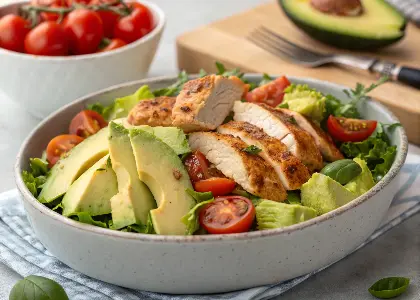
Day 4
Breakfast:
- Green Smoothie: Blend spinach, almond milk, flax seeds, and berries until smooth. (1 cup spinach, 1 cup almond milk, 1 tbsp flax seeds, ¼ cup berries)
Lunch:
- Chicken & Avocado Salad: Grill chicken strips, toss with greens, avocado, and balsamic vinaigrette. (4 oz chicken, 2 cups mixed greens, ½ avocado, 1 tbsp balsamic vinaigrette)
Dinner:
- Stuffed Sweet Potato: Bake sweet potato, top with black beans, salsa, and a sprinkle of shredded cheese. (1 medium sweet potato, ¼ cup black beans, 2 tbsp salsa, 1 tbsp cheese)
Snacks:
- Pineapple Chunks: Peel and cube fresh pineapple. (½ cup pineapple)
- Celery Sticks: Wash and cut celery into sticks. (1 cup celery sticks)
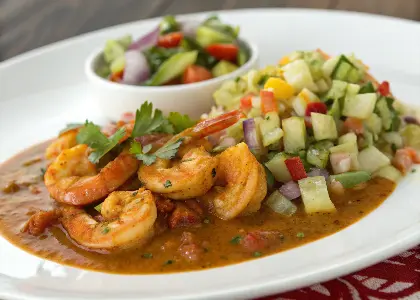
Day 5
Breakfast:
- Egg Muffins: Whisk eggs with diced bell peppers, onions & spinach; bake in muffin tin. (2 eggs, ¼ cup bell peppers, 2 tbsp onions, ¼ cup spinach)
Lunch:
- Lentil Soup: Simmer lentils with carrots, celery & tomatoes until tender. (1 cup cooked lentils, ½ cup carrots, ½ cup celery, ½ cup tomatoes)
Dinner:
- Shrimp Curry with Chopped Salad: Sauté shrimp in curry powder & coconut milk; toss cucumber, tomato, red onion & cilantro in lime juice & olive oil. (6 oz shrimp, 1 tbsp curry powder, ¾ cup light coconut milk, ½ cup chopped cucumber, ½ cup chopped tomato, 1 tsp olive oil)
Snacks:
- Blueberries: Rinse and serve fresh. (½ cup blueberries)
- Hard‑Boiled Egg: Boil egg until firm, peel and serve. (1 large egg)
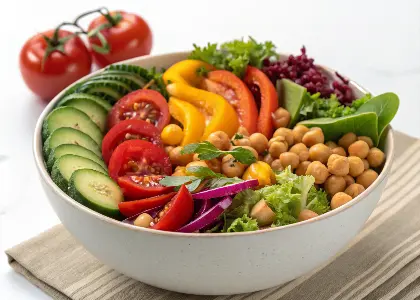
Day 6
Breakfast:
- Overnight Oats: Mix oats with almond milk and cinnamon; refrigerate overnight, top with flax seeds. (½ cup oats, ¾ cup almond milk, 1 tsp cinnamon, 1 tbsp flax seeds)
Lunch:
- Vegetable & Chickpea Stir‑Fry: Sauté mixed veggies and chickpeas in olive oil with tamari. (2 cups mixed veggies, ½ cup chickpeas, 1 tbsp olive oil, 1 tsp tamari)
Dinner:
- Baked Cod & Brussels Sprouts: Season cod, bake alongside Brussels sprouts; drizzle with olive oil. (6 oz cod, 1 cup Brussels sprouts, 1 tbsp olive oil)
Snacks:
- Grapes: Rinse and serve raw. (½ cup grapes)
- Bell Pepper Strips: Slice bell pepper into strips. (1 cup strips)

Day 7
Breakfast:
- Almond Flour Pancakes: Whisk almond flour, egg & almond milk; cook pancakes, top with berries & almond butter. (½ cup almond flour, 1 egg, ¼ cup almond milk, ¼ cup berries, 1 tsp almond butter)
Lunch:
- Spinach & Feta Salad: Toss spinach, feta, cherry tomatoes & cucumber; dress with lemon‑olive oil. (2 cups spinach, ¼ cup feta, ½ cup tomatoes, ½ cup cucumber, 1 tbsp lemon‑olive oil)
Dinner:
- Tofu & Veggie Stir‑Fry: Sauté tofu, broccoli, bell peppers & snap peas in ginger‑soy sauce. (4 oz tofu, 1 cup broccoli, ½ cup peppers, ½ cup snap peas, 1 tbsp ginger‑soy)
Snacks:
- Pumpkin Seeds and Blueberries: A handful of pumpkin seeds with blueberries (¼ cup)
- Air‑Popped Popcorn: Pop kernels without oil or salt. (2 cups popcorn)
Best Foods for Insulin Resistance
These foods are low in glycemic impact and support stable blood sugar, which makes them ideal for managing insulin resistance.
Here’s a comprehensive list of foods beneficial for insulin resistance:
1. Vegetables (Non-Starchy)
- Leafy Greens: Spinach, kale, arugula, collard greens, Swiss chard
- Cruciferous Vegetables: Broccoli, cauliflower, Brussels sprouts, cabbage
- Other Non-Starchy Veggies: Bell peppers, cucumbers, zucchini, tomatoes, mushrooms, asparagus, green beans, celery, radishes
2. Low Glycemic Fruits
- Berries: Blueberries, strawberries, raspberries, blackberries
- Citrus Fruits: Oranges, grapefruits, lemons
- Apples
- Pears
- Peaches
- Plums
- Cherries
- Kiwi
3. Lean Proteins
- Poultry: Skinless chicken breast, turkey breast
- Fish: Salmon, tuna, sardines, mackerel, trout
- Shellfish: Shrimp, crab, lobster
- Eggs
- Plant-Based Proteins: Tofu, tempeh, edamame
4. Healthy Fats
- Nuts and Seeds: Almonds, walnuts, chia seeds, flaxseeds, pumpkin seeds, sunflower seeds
- Oils: Extra virgin olive oil, avocado oil, flaxseed oil
- Avocados
- Olives
5. Low Glycemic Carbs
- Quinoa
- Bulgur
- Farro
- Barley
- Steel-Cut Oats
- Buckwheat
6. Legumes and Beans
- Chickpeas
- Lentils
- Black beans
- Kidney beans
- Pinto beans
- Green peas
7. Low-Fat Dairy or Dairy Alternatives
- Greek yogurt (unsweetened)
- Cottage cheese
- Kefir (unsweetened)
- Almond milk, coconut milk, or other unsweetened plant-based milks
8. Herbs and Spices
- Cinnamon
- Turmeric
- Ginger
- Garlic
- Cumin
- Basil
- Oregano
- Rosemary
- Thyme
9. Beverages
- Water
- Herbal teas (chamomile, peppermint, rooibos)
- Green tea (unsweetened)
- Black coffee (unsweetened, in moderation)
Worst Foods for Insulin Resistance
These foods often lead to blood sugar spikes, increased insulin demand, and inflammation, which can worsen insulin resistance over time.
1. Sugary Foods and Drinks
- Sugary beverages: Regular soda, fruit juices with added sugar, sweetened iced teas, energy drinks
- Desserts: Cakes, cookies, pastries, donuts, ice cream
- Candy and chocolate with added sugar
- Sweetened breakfast cereals
2. Refined Carbohydrates
- White bread
- White rice
- Regular pasta (non-whole grain)
- Bagels and white flour-based baked goods
- Crackers and pretzels made with refined flours
3. Fried Foods
- French fries
- Fried chicken and fish
- Fried snacks (potato chips, tortilla chips)
- Deep-fried appetizers (mozzarella sticks, onion rings)
4. Processed and Packaged Snacks
- Chips and puffs
- Packaged cookies and snack cakes
- Granola bars with added sugars
- Sugary protein bars
5. High-Fat, Processed Meats
- Bacon
- Sausages
- Hot dogs
- Processed deli meats with added sugars or fillers
6. High-Sugar Dairy Products
- Flavored yogurts with added sugars
- Sweetened condensed milk
- Ice cream and frozen yogurt with high sugar content
7. Processed Foods with Added Sugars
- Ready-to-eat sauces (barbecue sauce, ketchup, sweet salad dressings)
- Condiments with added sugar (honey mustard, teriyaki sauce)
- Processed, pre-packaged meals with hidden sugars
8. Alcohol (Especially Sugary Cocktails)
- Cocktails with high-sugar mixers (e.g., margaritas, mojitos, daiquiris)
- Sweet wines and dessert wines
- Beer and alcoholic ciders with high carbohydrate content
9. Trans Fats and Highly Processed Fats
- Margarine with hydrogenated oils
- Shortening
- Processed foods with partially hydrogenated oils (e.g., some packaged baked goods)
The Fastest Way to Lose Weight with Insulin Resistance
While there’s no magic bullet for weight loss, especially when dealing with insulin resistance, here are some strategies that can help accelerate your weight loss journey:
- Follow a low glycemic diet: Focus on foods that don’t cause rapid spikes in blood sugar. This includes non-starchy vegetables, lean proteins, and healthy fats.
- Practice portion control: Even healthy foods should be consumed in moderation. Use smaller plates and be mindful of serving sizes.
- Increase physical activity: Combine cardio exercises with strength training. This helps burn calories and build muscle, which can improve insulin sensitivity.
- Try intermittent fasting: Under medical supervision, intermittent fasting can help improve insulin sensitivity and promote weight loss.
- Get enough sleep: Lack of sleep can disrupt hormones that regulate hunger and metabolism. Aim for 7-9 hours per night.
- Manage stress: Chronic stress can lead to weight gain. Practice stress-reduction techniques like meditation or yoga.
- Stay hydrated: Drinking water before meals can help you feel fuller and potentially reduce calorie intake.
Final Thoughts
An insulin resistance diet can be a powerful tool for managing blood sugar levels, improving insulin sensitivity, and supporting overall health.
By focusing on nutrient-dense, low glycemic foods and avoiding refined sugars and unhealthy fats, you can take meaningful steps toward reversing insulin resistance.
Coupled with regular exercise, proper sleep, and stress management, these dietary changes can make a significant impact on your well-being.
With consistency and commitment, a diet for insulin resistance can help you achieve balanced energy levels, better metabolic health, and a sustainable approach to managing insulin resistance.
- 7-day apple cider vinegar cleanse instructions
- Warrior diet meal plan 21 days
- 7-day no sugar diet menu
- Carnivore diet meal plan
- 21-day fix eating plan
- 7-day meal plan for diabetics
- Easy Blue Zone meals for beginners
- Endomorph diet plan
FAQs
Can you be insulin resistant and slim?
Yes, you can be insulin resistant and slim. This condition, known as “metabolically obese normal weight” (MONW), affects about 25% of normal-weight individuals.
Factors like genetics, diet quality, and physical activity levels can contribute to insulin resistance regardless of body weight.
What is the best exercise for insulin resistance?
The best exercises for insulin resistance combine both aerobic and resistance training.
A mix of moderate-intensity cardio (like brisk walking or cycling) for 150 minutes per week and strength training 2-3 times per week can significantly improve insulin sensitivity.
High-intensity interval training (HIIT) has also shown promising results in reducing insulin resistance.
Is fasting good for insulin resistance?
Intermittent fasting, in particular, has shown promise in improving insulin sensitivity. During fasting periods, insulin levels drop, allowing cells to become more responsive to insulin when you do eat.
How to reverse insulin resistance?
Reversing insulin resistance involves a healthy diet rich in fiber, lean proteins, and low glycemic foods, regular exercise, managing stress, and maintaining a healthy weight.
What can I drink to lower insulin resistance?
To help lower insulin resistance, drink water, herbal teas, and green tea. These beverages have no sugar and can support better hydration and metabolism without spiking blood sugar.
